Biology Researcher Naomi Greenberg (C’24) Awarded Marshall Scholarship to Pursue Dual Passions in Genetic Research and Science Communication
Researcher and writer Naomi Greenberg (C’24) was one of five Hoyas to be named a 2024 Marshall Scholar.
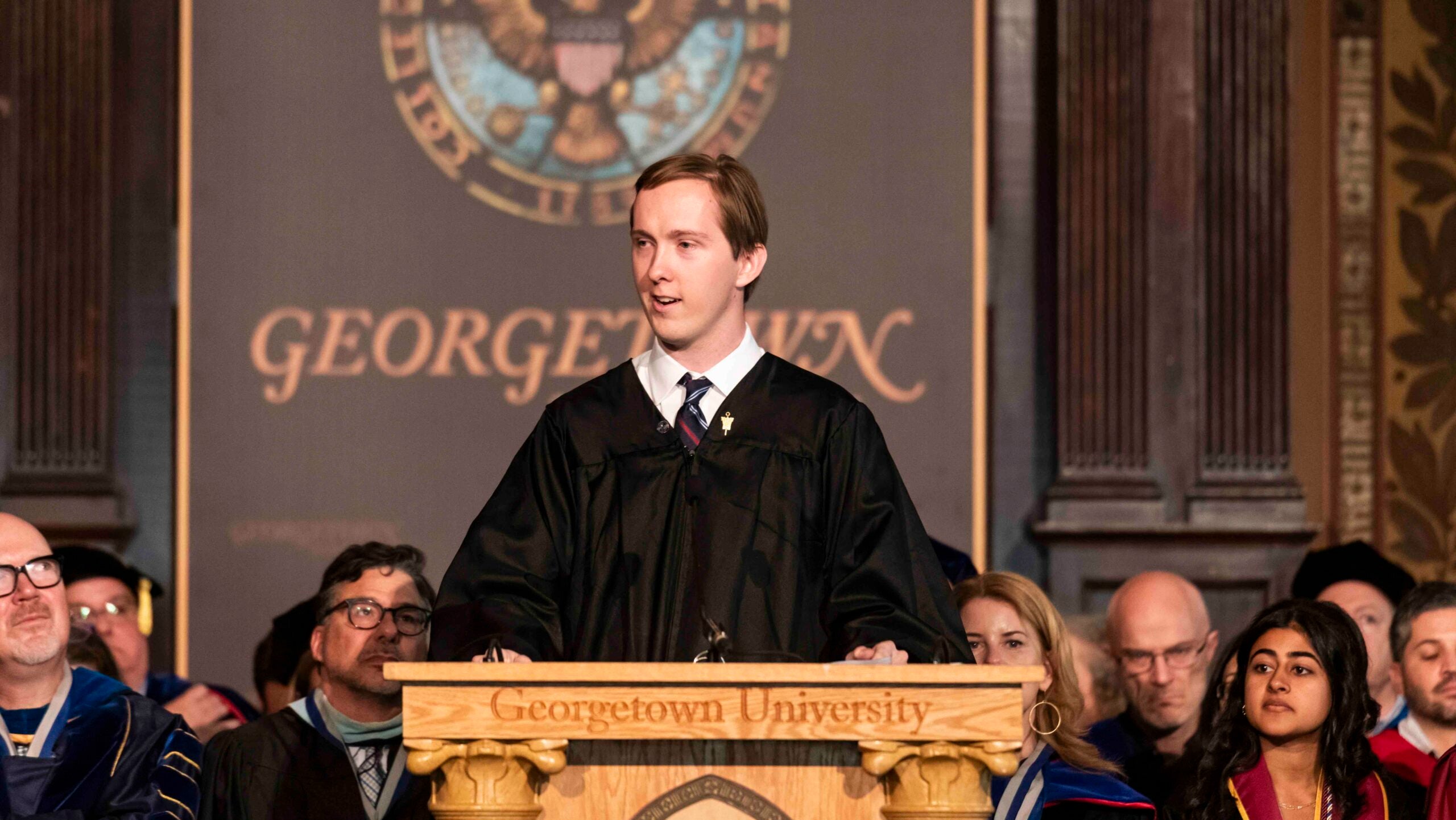
The Georgetown University College of Arts & Sciences gathered in historic Gaston Hall to honor exceptional graduating seniors and outstanding faculty members at the 105th annual Tropaia Exercises.
The awards ceremony, which takes its name from the ancient Greek word for trophy, honors graduating seniors for their outstanding accomplishments, both within and outside of the classroom.
“You are more than ready for what the future holds,” said Rosario Ceballo, dean of the College of Arts & Sciences, to the assembled graduates. “If complacency begins to creep in, shake it away and never stop learning new things, asking more questions and finding connections with others. Congratulations on all you have achieved and best wishes for embracing the many adventures that lie ahead.”
This year, Joshua Gavsie (C’24) was awarded the Coakley Medal, Renée Clark (C’24) the Kraft Medal, Mike Whittington (C’24) the Louis McCahill Award and Naomi Greenberg (C’24) the Spronck Medal. Connor Hartigan (C’24) delivered the Cohonguroton Address. Amy Leonard received the Bunn Award for Faculty Excellence and addressed the graduating class.
Joshua Gavsie received the Coakley Medal, which is awarded annually to the College of Arts & Sciences senior who, in the opinion of the faculty, most embodies the “qualities of loving service, honor and courage in all phases of their college life.” In addition to receiving the Coakley Medal, Gavsie was awarded the Father Robert Hoggson, S.J. Award for Excellence in Sociology.
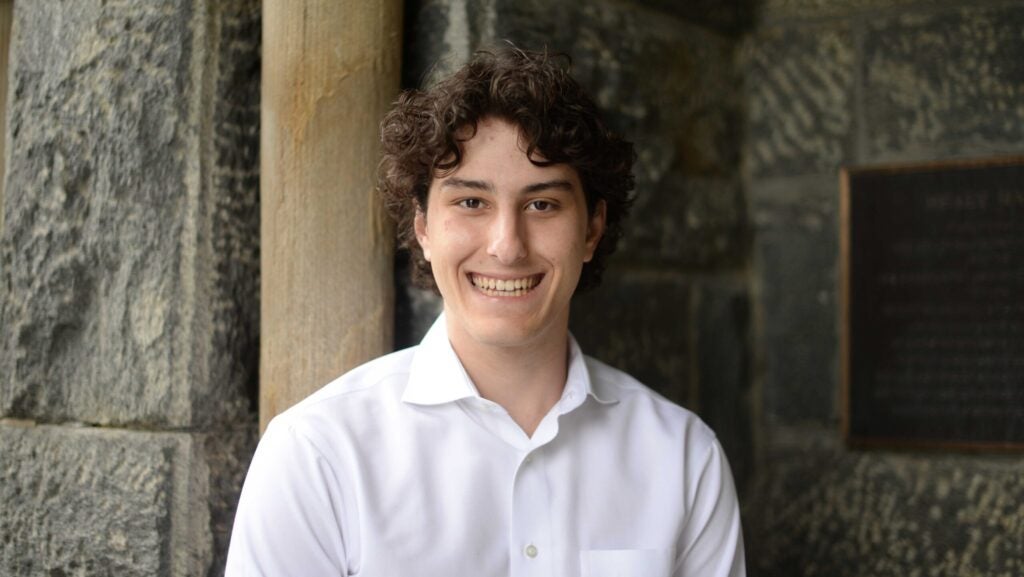
Joshua Gavsie (C’24), a double major in government and sociology.
Gavsie, a double major in government and sociology, has committed himself to pursuing both scholastic and moral questions during his time at Georgetown.
Gavsie has worked with Corey Fields, the Idol Family Term Chair in the Department of Sociology, on research that examines organizational statements related to COVID-19 and racial justice and inequality in the United States. In his own independent and complementary research, Gavsie has explored how organizational statements related to labor practices.
During Gavsie’s sophomore year, as the Class of 2024 arrived on the Hilltop in the months following the COVID-19 pandemic, he worked as a founding member of the Georgetown Coalition for Workers’ Rights. Gavsie worked with the newly-formed coalition to rebuild long-standing connections between the school’s student body and the dining hall, housekeeping and facilities workers.
Gavsie worked with the Center for Social Justice’s HOME Program, which works with people experiencing homelessness through a variety of channels, and the Georgetown Ministry Center, where he helped provide meals and other services to the housing insecure. As an intern with the Kalmanovitz Initiative for Labor and the Working Poor, Gavsie spent his senior year working on workers’ rights issues for the Washington Lawyers Committee for Civil Rights and Urban Affairs. After graduation, Gavsie is planning on attending law school to pursue a career in labor law, which will enable him to continue fighting for workers’ rights.
The Coakley medal was established in memory of Henry “Hank” Coakley, a Georgetown alumnus and U.S. Air Force pilot, by his wife, Elizabeth Coakley.
Renée Clark received the Kraft Medal, given to the graduating student who embodies a “spirit of humility, cooperation and commitment as a woman or man for others in all facets of college life.”
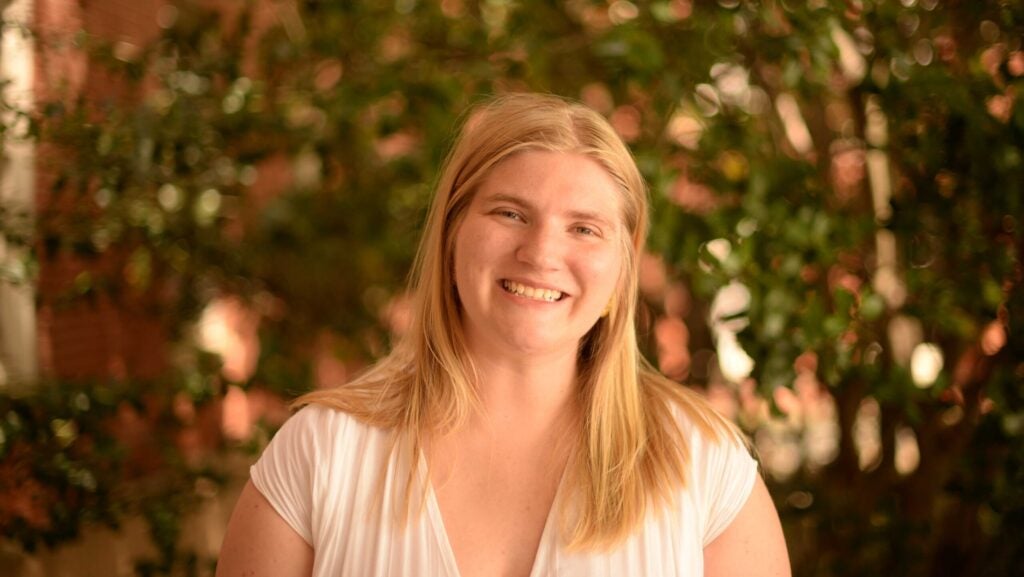
Renée Clark, a double major in government and theology.
Clark, a double major in government and theology, has produced a trove of interdisciplinary research during her time at Georgetown that explores the intersections of religiosity, race and public policy. Her honors thesis, which was completed as part of her government major, mapped out a theology of reconciliation for communities affected by the opioid epidemic in Appalachia.
In her first year, Clark dove headfirst into research at the first opportunity after taking Bernie Cook’s course Engaging Slavery Through Research and Radical Imagination. After becoming enthralled with archival research, Clark began working with Cook, associate dean in the College of Arts & Sciences and founding director of the Film and Media Studies Program, on research related the lives of the GU272 and the legacies of Jesuit slaveholding.
A Laidlaw Fellow, Clark researched the relationship between faith communities and civic engagement. Originally from Greene, New York, in the Appalachian region, Clark was interested in a comparative study of white church communities in her home state and Black church communities in North Carolina. Clark continued toying with ideas of religion, religiosity and race, which led her to her second major in theology and religious studies.
The Kraft Medal was established by Mrs. Cornerlia Kraft McKee in memory of her mother, Katherine Kraft.
Mike Whittington, a biochemistry major, received the Louis McCahill Award, given to the student of the graduating class who has “shown perseverance and determination of a high order in pursuing his or her educational objectives at Georgetown.”
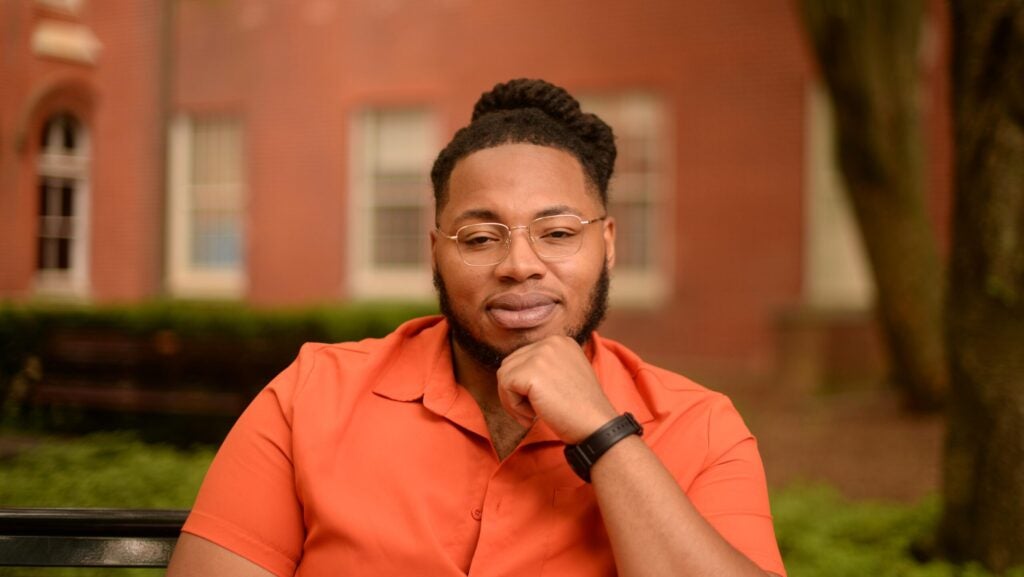
Mike Whittington (C’24), a biochemistry major.
Whittington, who first arrived on campus in 2015, took an academic leave of, a cumulative, three years, during which time they took on a number of community-building projects in their hometown of Trenton, New Jersey. Whittington serves as the Director of Operations for Tha Block Trenton, an arts-based collective that works in tandem with local businesses and organizations to provide much-needed resources to all of the city’s residents, including those who are unhoused.
Whittington worked as a training associate and program lead at the Center for Supportive Schools, an educational nonprofit in New Jersey focused on boosting student success across the board. They also serve as secretary of the board for 120 East State, an organization working to transform Trenton’s historic First Presbyterian Church into a community center and arts space.
During their time on and off the Hilltop, Whittington has pursued a slew of academic and personal interests, ranging from becoming a licensed EMT to a certified yoga instructor to a community organizer.
The McCahill Award was established in 1960 by Mr. Eugene McCahill and Mr. Francis McCahill in memory of their brother, Louis, who died in the service of his country in the First World War.
In embodying the spirit of this award, Mike has remained dedicated and unwavering in their work as a person for others, a scholar and a multi-hyphenate.
Naomi Greenberg received the Lambert H. Spronck Medal, which is awarded to the student who has “combined good scholarship with significant contributions to extracurricular activities and who has manifested a spirit of giving completely to whatever Georgetown project of activity she or he has engaged in while at the university.”
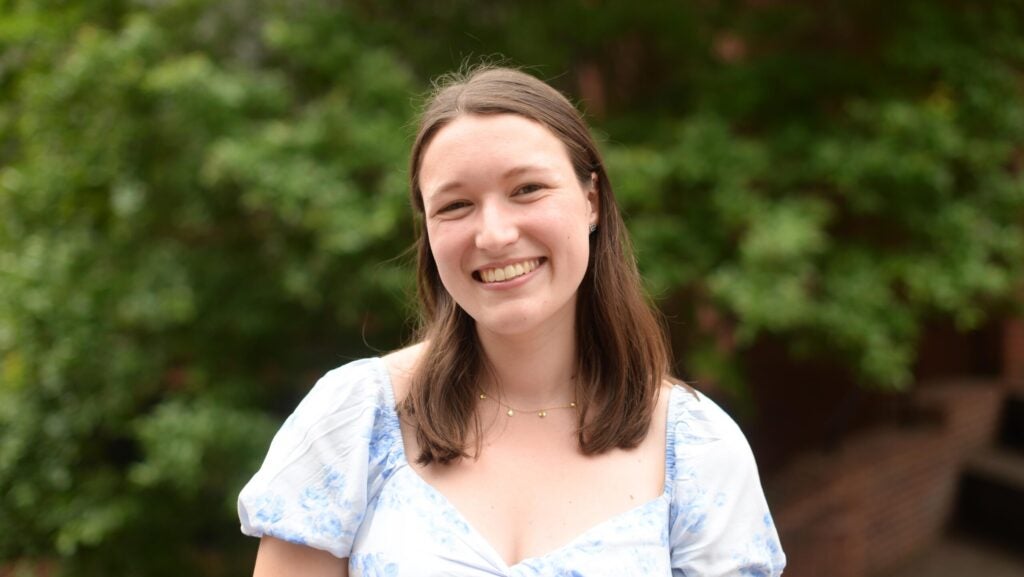
Naomi Greenberg (C’24), a biology major and journalism minor.
Greenberg, a biology major and journalism minor, has blended her passions for science and writing during her time on the Hilltop. She conducted research into molecular biology, molecular genetics and evolutionary genetics. Throughout Greenberg’s undergraduate career, Manus Patten, a teaching professor in the Department of Biology, acted as an academic and personal mentor.
“I’m so grateful for the opportunities Georgetown offers its students to pursue not just academic passions, but extracurriculars as well,” Greenberg said. “Working at The Hoya and creating the science section was a highlight of college for me and I’m humbled that my peers and mentors saw the value in that effort.”
Greenberg interned at the National Institutes of Health, where she worked in the lab of Takashi Akera, who studies chromosome dynamics and evolution. She also spent a summer conducting research for the Max Planck Institute for Brain Research, where she worked in neurobiologist Erin Schuman’s lab to optimize research experiments and learn molecular biology techniques. This research was supported by a Royden B. Davis Fellowship.
On campus, Greenberg spent all four years involved with The Hoya, working as a copy assistant, copy deputy and copy chief. She then founded and led the publication’s science section, which shines a spotlight on science-related news on the Hilltop and beyond. During her last year as an undergraduate, Greenberg worked at the Smithsonian National Museum of Natural History writing for both Smithsonian Voices and the Ocean Portal
Greenberg was named a 2024 Marshall Scholar, one of just 413 in the entire country. During her junior year, she was one of two students in the College of Arts & Sciences to receive a Goldwater Scholarship. After graduation, Greenberg will attend Imperial College London where she will pursue a Master of Research (MRes) in systems and synthetic biology.
Connor Hartigan delivered the Cohonguroton Address at the invitation of the dean, Rosario Ceballo. Taking its name from the Algonquin word for the Potomac River, the Cohongurton Address is delivered by one of the graduating class’s most outstanding students.
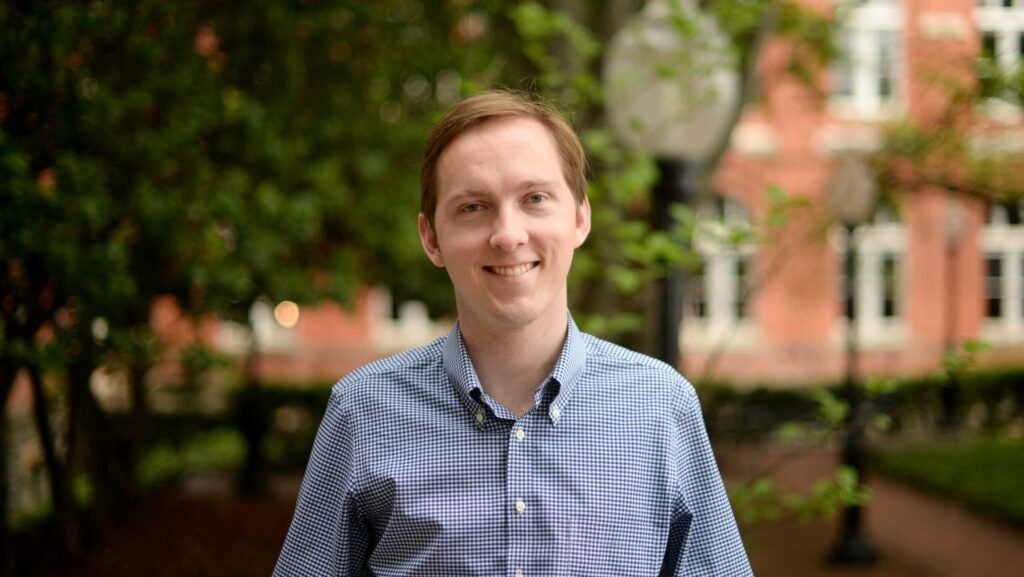
Connor Hartigan (C’24), a double major in French and government with a minor in theology and religious studies.
In his address, Hartigan addressed the Christian notion of wounded beauty and its relationship to the graduating class.
“Jesus, as God incarnate, is beauty, goodness and truth itself. Yet on the cross, we see him utterly broken, pierced and bleeding,” Hartigan said. “The faith teaches that it is precisely in this sacrificial suffering — in these wounds of love — that we can find authentic beauty.
I think we’ve all learned, over the course of our time here, that our beautiful world bears many wounds.”
In his remarks, Hartigan touched on climate catastrophe, authoritarian political movements and xenophobia as examples of the wounds afflicting our shared, beautiful world. To treat these wounds, Hartigan argued, graduating seniors should act as, in the words of St. Francis of Assisi, instruments of peace.
“When we study, when we learn, when we apply the fruits of our education to make a difference in the world, we do so out of love,” Hartigan said. “Our education at Georgetown has taught us more about how to love — it has imparted to us a deep appreciation, and even reverence, for creation, for all life and for the inherent dignity and worth of each human being.”
Hartigan pursued a double major in French and government with a minor in theology and religious studies. During the Tropaia Exercises, Hartigan was awarded the Loyola Medal, which is bestowed upon the member of the graduating class of the College of Arts & Sciences who best exemplified Catholic and Jesuit ideals in their collegiate life.
After graduation, Hartigan will begin working as an O’Hare Fellow at America Media, a Jesuit publication based in New York City.
“During this year, I’ll have the chance to create content for America‘s various platforms, both in print and online, on questions of faith, Jesuit spirituality and their relationship to public life,” Hartigan said. “This position will be an ideal setting in which to translate Georgetown’s values into a professional context.”
Amy Leonard, an associate professor in the Department of History, received the Bunn Award for Faculty Excellence.
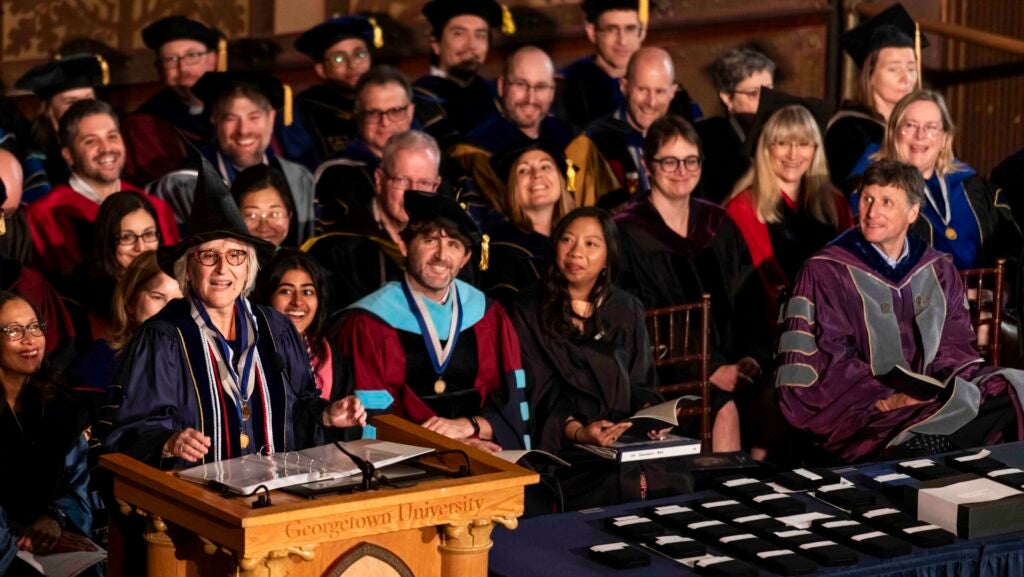
Professor Amy Leonard dons a witch hat, a reference to one of her most popular courses, while addressing the assembled students in Gaston Hall.
Established in 1967 to honor Rev. Edward B. Bunn, S.J., the award is chosen by a vote of the senior class and presented to the member of the College faculty who “is admired and respected by all students for their service to Georgetown in the classroom and on the campus community.”
Leonard has published widely on the women of Early Modern Europe, shedding light on the lives of people previously relegated to the peripheries of history and the margins of textbooks.
“Professor Leonard embodies the best of our faculty here in the College of Arts & Sciences, not just in her groundbreaking research, but also in the way that she invites students into an ongoing conversation with the past, present and future of human society and our struggle for a more just world,” Ceballo said.
In her address to the assembled graduates, Leonard reflected on her career as a historian and a much-loved class that she teaches with Alison Games, which explores witches and witchcraft in the Early Modern world. The course, which was restructured in 2020, offered a high watermark for both professors and students during an uncertain period.
“I hope you can learn from that first online year — the disappointment, anger and trauma, but also the successes — and use it going forward,” Leonard said. “Remember how you rose to the occasion; that you persevered and, yes, showed your resilience, by doing what you could to create your own signature college experience.”
“It has been my deepest privilege to teach at Georgetown and I am incredibly honored and humbled to be the recipient of this award.”
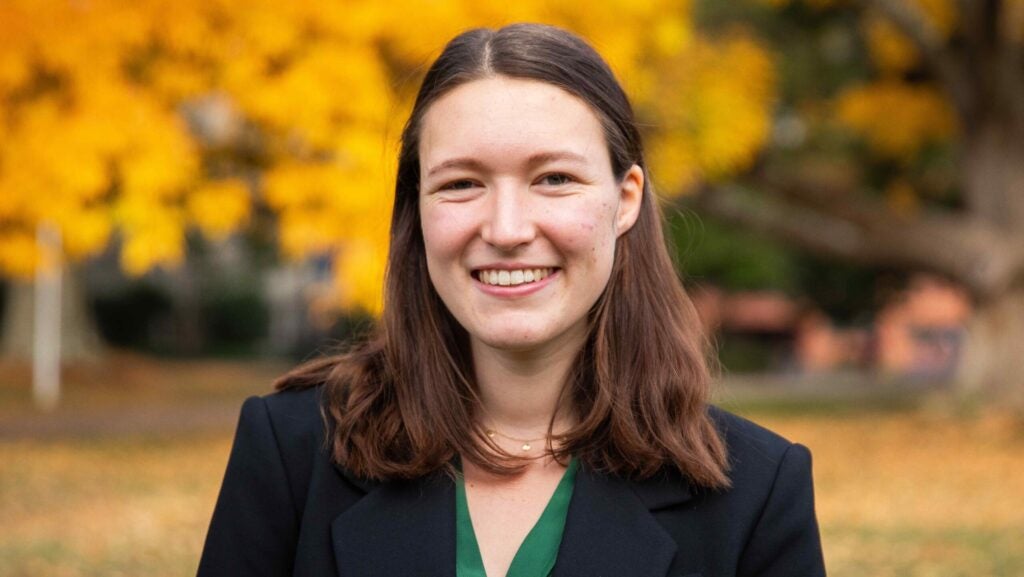
Researcher and writer Naomi Greenberg (C’24) was one of five Hoyas to be named a 2024 Marshall Scholar.
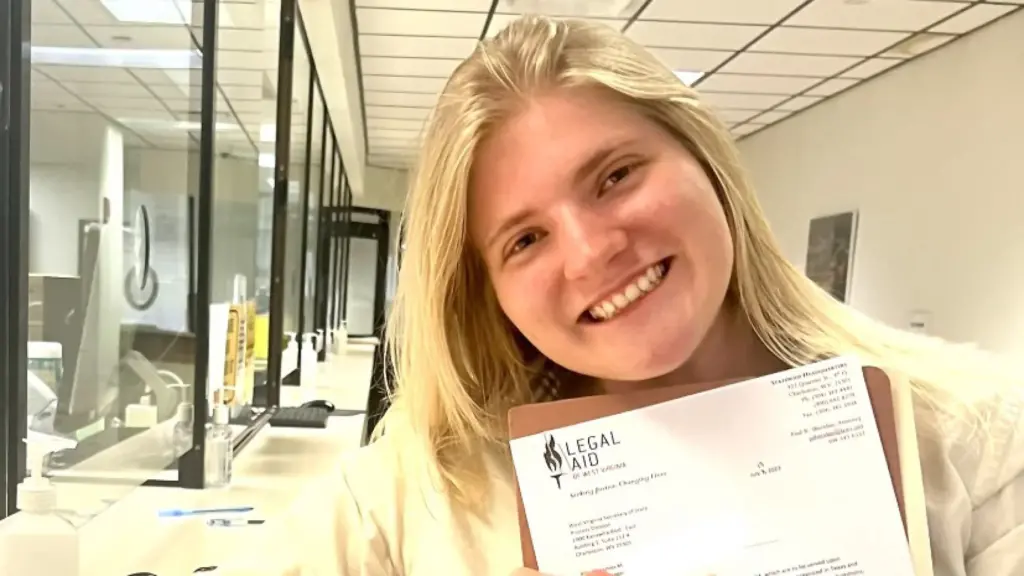
When Renée Clark (C’24) sent a cold email in December to an attorney to learn more about his work, she was not expecting much of a response.
Read Full Story